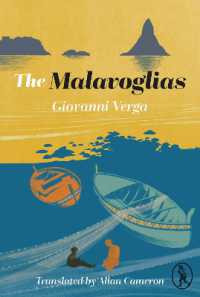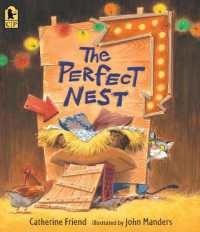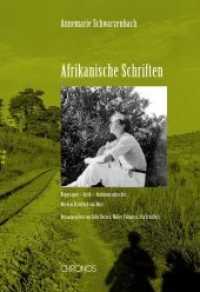- ホーム
- > 洋書
- > 英文書
- > Nature / Ecology
Full Description
This book explores the link between the Food-Water-Energy nexus and sustainability, and the extraordinary value that small tweaks to this nexus can achieve for more resilient cities and communities. Using data from Urban Living Labs in six participating cities (Eindhoven, Gdańsk, Miami, Southend-on-Sea, Taipei, and Uppsala) to co-define context-specific challenges, the results from each city are collated into an Integrated Decision Support System to guide and improve robust decision-making on future urban development.
The book presents contributions from CRUNCH, a transdisciplinary team of scholars and practitioners whose expertise spans urban climate modelling; food, water, and energy management; the design of resilient public space; collecting better urban data; and the development of smart city technology. Whilst previous works on the Food-Water-Energy nexus have focused on large, transnational cases, this book explores local ways to use the Food-Water-Energy nexus to improve urban resilience. It suggests tangible ways in which the cities and communities around us can become both more efficient and more climate resilient through small changes to their existing infrastructure.
Over half of the world's population lives in urban areas, and this is expected to increase to 68% by 2050. We urgently need to make our cities more resilient. This book provides a planning tool for decision-making and concludes with policy recommendations, making it relevant to a range of audiences including urbanists, environmentalists, architects, urban designers, and city planners, as well as students and scholars interested in alternative approaches to sustainability and resilience.
Chapter 2 of this book is freely available as a downloadable Open Access PDF at http://www.taylorfrancis.com under a Creative Commons Attribution-Non Commercial-No Derivatives (CC-BY-NC-ND) 4.0 license.
Contents
Preface Steffen Lehmann, Introduction Julia Brown, Claire Coulter, and Alessandro Melis, PART 1: Urban Living Laboratories, 1.0 Introducing the CRUNCH Urban Living Labs Claire Coulter, 1.1 Eindhoven: Brainport Smart District: A circular economy experiment Maryam Ghodsvali, Gamze Dane, and Bauke de Vries, 1.2 Gdańsk: Urban Initiative Laboratory Joanna Bach-Glowinska, Karolina Krośnicka, Jacek Łubiński, and Joanna Tobolewicz, 1.3 Miami: Data-driven planning and scenario tools Thomas Spiegelhalter, 1.4 Southend-on-Sea: Green infrastructure for climate resilience Claire Coulter, 1.5 Taipei: Sustainable management for wastescapes: A Food-Water-Energy nexus experiment Mei- Hua Yuan, Pei-Te Chiueh, Yu-Sen Chang, Hsin-hsin Tung, Chnag-Ping Yu, Hwong-wen Ma, Shang-Lien Lo, 1.6 Uppsala: Groundwater management in the neighbourhood of Rosendal Vera van Zoest, Edith Ngai, Shashank Shekher Tripathi, and Archit Suryawanshi, PART 2: Food-Water-Energy nexus findings, 2. The urban living lab as an adaptive governance mechanism for the transdisciplinary Food-Water-Energy nexus: Lessons learned from six local contexts Maryam Ghodsvali, Gamze Dane, and Bauke de Vries, 3. Urban greening snakes and ladders: A case study of the practical realities of implementing Food-Water-Energy nexus projects in Southend-on-Sea, UK Heather Rumble and Julia Brown, 4. Capacity: Transforming challenges into opportunities Joanna Bach-Głowińska, Jacek Łubinski, and Joanna Tobolewicz, 5. Data and knowledge supporting decision-making for the urban Food-Water-Energy nexus Mei- Hua Yuan, Joanna Bach-Głowińska, Pei-Te Chiueh, Yu-Sen Chang, Hsin-hsin Tung, Chnag-Ping Yu, Hwong-wen Ma, Jacek Łubiński, Shang-Lien Lo, 6. Development of an integrated decision support system (IDSS) Vera van Zoest, Edith Ngai, Shashank Shekher Tripathi, and Archit Suryawanshi, 7. Genetic Water-Energy-Food nexus design research for Miami's Greater Islands: Climate Resilient Urban Nexus CHoices (CRUNCH) - scripting and coding AI-M's Thomas Spiegelhalter, Levente Juhasz, and Srikanth Namuduri, 8. The role of Digital Twins in the CRUNCH project Chris Cooper and Claire Coulter, Conclusions Julia Brown, Claire Coulter, and Alessandro Melis








